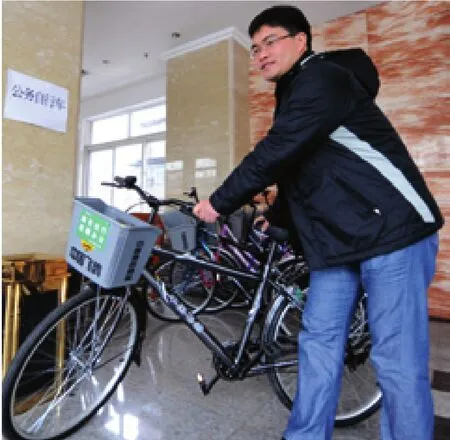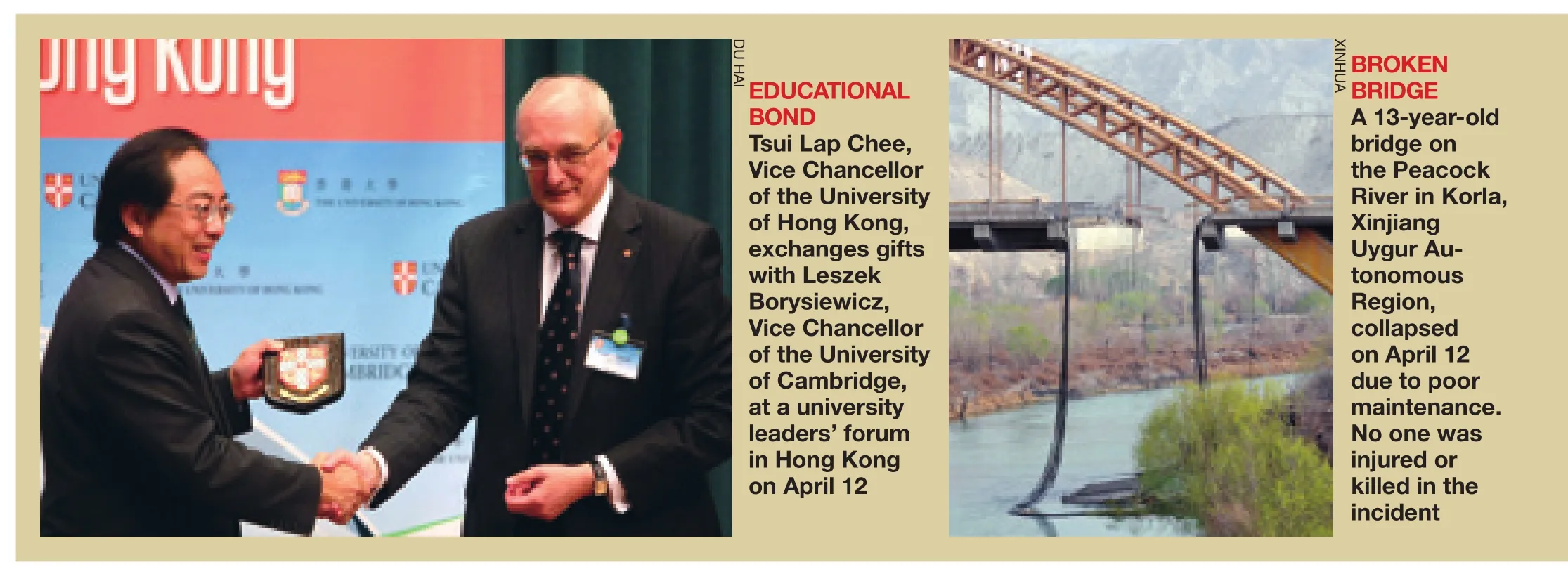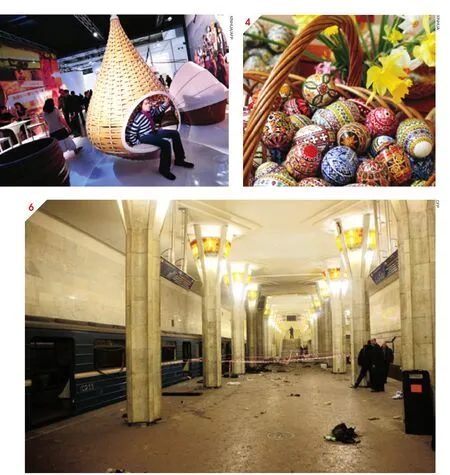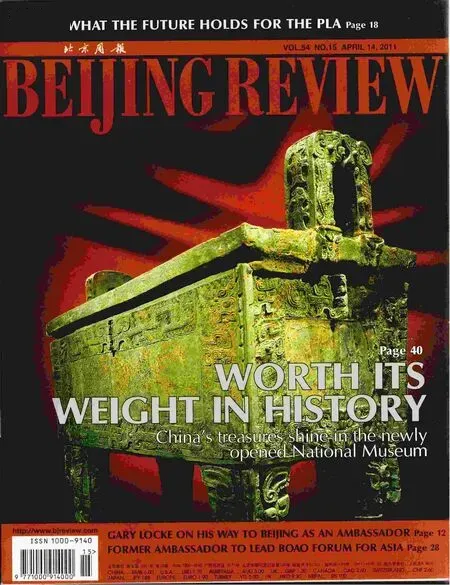WEEKLY WATCH
2011-10-14
WEEKLY WATCH
OPINION
Kindergarten Policy
Eleven illegal kindergartens for migrant workers’ children in a village of Beijing’s Fengtai District were shut down on April 10 because of hidden dangers in the old houses, fire risk and sanitation problems. Although it’s a move to protect the children there, the shutdown will throw hundreds of children into the difficult condition of having nowhere to stay before they go to primary school.
If relevant departments do not shut down these kindergartens, it’s irresponsible toward the children, but if the kindergartens are simply closed, where will the children go? Before making their decisions, these departments should first take into account alternative placement for the children affected.
It is the local government’s responsibility to provide migrant workers’ children with basic educational opportunities. It’s not impossible. Nanjing, capital city of Jiangsu Province, will begin to offer 170,000 preschoolers an annual subsidy of 2,000 yuan ($298.5) from September, covering migrant workers’ children.
The State Council has already clearly said preschool education should be developed into a well-designed system to cover both urban and rural areas and children should be ensured basic, quality preschool education. It’s hoped this policy can be tangibly implemented, so these children in Fengtai will find somewhere to spend their preschool days.
Beijing Times
Social Capital
China’s biggest public rental housing project of 2011 was recently launched in Qingdao, Shandong Province, with a quarter of its capital being investment from society at large. It shows private investment can play an important role in the construction of government-subsidized housing projects.
But, since the construction of government-subsidized houses is not very profitable, the method of attracting social capital becomes a problem. It’s unrealistic to ask real estate developers to give up their economic interests and turn to charity, so the key for the government is to work out effective incentive mechanisms to encourage the involvement of social capital.
Take the development of slum areas, for example. These districts can be divided into two ways, one of high development value and the other of low value. Because of the former, due to foreseeable profits, developers are naturally willing to take part. When it comes to areas of low development value, government needs to offer preferential policies to developers, such as tax reduction and exemption, and favorable land transfer fee. When there is enough social investment to fill in the capital gap and the public is provided with adequate relocation subsidies, disputes and hindrance to these development projects will naturally decline.
Businesses live and work for interests, and this is the market rule. How to make best use of this rule to benefit both businesses and the public poses a test for the government.
People’s Daily
Medical Resourcing
To ensure everyone a basic health care service is one of China’s health care reform objectives, especially true for public hospitals. But, the People’s Hospital of Zhengzhou, in Henan Province, has preserved a lot of expensive luxury wards while relatively cheap, common wards are unable to meet demand and sometimes patients have to lie on temporary corridor beds.
These luxury wards are reserved for VIP members, and the average patient is not allowed even if they can afford to pay. It’s OK for the rich, or the privileged, to pay for VIP service, but public hospitals are different from other service sectors. These hospitals’medical resources are limited. When luxury wards take up too many resources, common patients will be deprived.
A large number of VIP wards have impaired basic equality in medical services. When medical fees and resources are still a big problem on average person, public hospitals should reflect on deficiencies in their service and try to make it fair and equal, instead of squeezing out common wards for luxury ones.
The responsibility of hospitals, especially public hospitals, is to heal the wounded and save the dying. They are not supposed to be profit-driven companies. When greater numbers become VIP members, hospitals might begin to charge heavily. When this has developed onto a certain scale, good medical resources will be farther and farther away from ordinary people.
Hospital VIP service is able to fulfill people’s high-end requirements, but given overall medical services are still insufficient, excessive VIP service will push limited medical resources to a small number of people, leading to increasingly serious inequality.
Xi’an Evening News
Official Bicycles
Civil servants working for the Education Bureau of the Jinniu District in Chengdu, Sichuan Province, who take a business journey of less than 3 km will in future not be offered cars but have to ride bicycles, and the bureau has already purchased five bicycles.
Civil servants using bicycles for business purposes is not news. Last December, a provincial government department in Hubei Province purchased a number of bicycles for its civil servants to use for nearby business.
Civil servants may see bicycles as undignified using them. It’s important to help them get rid of this discrimination against bicycles and make bureaucrats feel like they should use them in daily work.
The use of bicycles on short business trips may not be all that significant, but it at least highlights ideas such as energy conservation, frugality and contact with the people. These concepts will help to push forward the country’s reform of official car use.
Yangtze Evening News

BY BICYCLE: Bicycling is popular with the civil servants of a government department in Hubei Province
SOCIETY
Helping the Children
The Ministry of Public Security said on April 12 it was carrying out a six-month campaign to identify unattended children found by authorities.
Local police will conduct DNA tests on children with unknown identities and, to learn whether they have been abducted, compare the results with information contained in a national anti-trafficking DNA database.
In 2009, the ministry set up a national DNA database to aid rescue efforts of abducted children. It has collected 20,000 blood samples from unidentified children and from parents whose children are missing, which has helped to confirm the identities of 1,040 children.
Curbing Antibiotics
China will curb the misuse of antibiotics, mainly at large hospitals, to deal with rising drug resistance, said the Ministry of Health on April 11.
By the end of this year, rates of antibiotics use among inpatients and outpatients on the Chinese mainland are expected to be lowered from 70 percent and 50 percent to around 50 percent and 20 percent, which is in line with international standards.
“The long-time overuse is related to factors including medical workers’ lack of self-discipline and the current system whereby hospitals rely on drug sales for revenue,” said Zhao Minggang, Deputy Director of the Department of Medical Administration of the ministry.
Hi-Tech Aid
China donated integrated satellite broadcasting and receiving stations and its homedeveloped, comprehensive meteorological information analysis and processing system to 16 Asian countries on April 11.

GROUNDBREAKING FLIGHT Yangtze River Express Airlines Co. Ltd., the firstairline jointly invested by China’s mainland and Taiwan, completes its inaugural cross-Taiwan Straits freight flight from Chongqing to Taipei on April 12
The recipients of the equipment were Bangladesh, Indonesia, Kyrgyzstan, Laos, Malaysia, Maldives, Mongolia, Burma, Nepal, Pakistan, the Philippines, Sri Lanka, Tajikistan, Thailand, Uzbekistan and Viet Nam.
The analysis and processing system provides meteorologists an integrated working platform to forecast disastrous weather conditions such as typhoons, as well as the ability to forecast medium-, short-term and momentary weather conditions.
The China Meteorological Administration said the donations could help improve meteorological disaster prevention and mitigation capabilities as well as the ability to address climate change in developing Asian countries.
Underground Haven
China’s most advanced coalmine refuge shelter completed a test run in a coalmine in Shanxi Province on April 10.
Eighty volunteers stayed in the underground rescue facility for 48 hours, which is equipped with oxygen, electricity, and telecommunications equipment. A permanent borehole connects it to the outside world, allowing air, fresh water and food to be lowered down.
Built in May 2010, the newly developed facility is designed to be able to sustain 80 to 100 miners after a coal mine disaster.
Traditional rescue shelters in China’s coal mines can only hold five to eight people at a time.
Tourism Stimulus
China’s first and largest rocket and satellite launch base, the Jiuquan Satellite Launch Center in northwestern Gansu Province, will boost tourism by offering new attractions in the next five years.
The satellite launch center, established in 1958, is where China’s three manned spaceships have blasted off since October 2003.
Jiuquan will build an aerospace-themed cultural town and add to its interactive aerospace experience programs and facilities. Additionally, a wind power museum will be built near China’s first 1-million-kw wind power station in the city.

ECONOMY
Monetary Policy
China has vowed to implement its prudent monetary policy in a bid to set the domestic economy on the right track as uncertainties abound both at home and abroad.
To realize this year’s economic and social development goals, China needs to properly coordinate the relationship between monetary supply and structural overhaul as well as checking inflation and advancing economic growth, according to a statement released after an executive meeting of the State Council, China’s cabinet, presided over by Premier Wen Jiabao.
The statement said China will adopt multiple tools, including an open market operation, a bank reserve requirement ratio and interest rate adjustments to check market liquidity.
Online Payments
The Ministry of Commerce (MOFCOM) published its long-awaited guidelines for e-commerce third-party payment service providers on April 12 in a bid to regulate China’s rapidly developing business-toconsumer industry that processes about six times as many transactions as world retail giant Wal-Mart.
The 16-page publication aims to create a“fair, honest and safe” transaction platform for the country’s online retailers and shoppers, said Jiang Zengwei, Vice Minister of Commerce.
MOFCOM’s guidelines echoed an ongoing campaign to crack down on activities related to copyright infringement and the production and sale of fake and counterfeit products nationwide.
Banking in the U.S.
China’s Bank of Communications (BOCOM), the fifth largest commercial bank in China by assets, said on April 10 the bank will broaden its wholesale services in the United States to include deposits, lending and trade finance.
Hao Xiaohui, General Manager of the bank’s New York branch, said the Federal Reserve Board had approved the bank’s application to establish a branch in San Francisco, California—BOCOM’s second branch in the United States.
Besides the United States, BOCOM operates overseas branches in Japan, Singapore, South Korea, and Germany and a representative office in Great Britain.
More Contracts
China State Construction Engineering Corp., a construction behemoth in China and the largest international construction contractor in the world, signed contracts worth 191.5 billion yuan ($29.3 billion) in the first quarter of this year, surging 95 percent over the same period a year ago.
The company said it achieved sales of 18.7 billion yuan ($2.86 billion) in its real estate business with total area sales covering 1.63 million square meters.
Macao Tourism
Total spending (excluding gaming expenses) of visitors to Macao Special Administrative Region reached $4.73 billion in 2010, with its per-capita spending of visitors amounting to $189.75, say figures released on April 11 by the region’s Statistics and Census Service.
Analyzed by place of residence, per-capita spending of visitors from the Chinese mainland remained the highest, reaching $254.8.
In 2010, per-capita non-shopping spending (excluding gaming expenses) of visitors amounted to $93.1, of which expenses on accommodations and food and beverage accounted for the largest share of 45 percent and 37 percent respectively.
Per-capita shopping spending amounted to $96.6, with expenses mainly on local food products, jewelry and watches and clothing.


1. LUXEMBOURG
The EU’s foreign policy chief Catherine Ashton talks with Libyan rebel representative Mahmoud Jibril during an EU foreign ministers’ meeting on April 12
2. JAPAN
Engineers work at the Fukushima Daiichi Nuclear Power Plant on April 12. On that day, Japan raised the severity level of the radiation leak accident at the plant to seven, the worst on the international scale
3. ITALY
A man tries out a hanging chair at the 50th Milan International Furniture Fair on April 12
4. ROMANIA
A basket filled with Easter eggs at an exhibition of the treats in a Bucharest museum on April 11
5. ARMENIA
Li Changchun (left), a member of the Standing Committee of the Political Bureau of the Communist Party of China Central Committee, meets with Gagik Tsarukyan, leader of Prosperous Armenia, in Yerevan on April 12
6. BELARUS
Minsk’s Oktyabrskaya Subway Station after a bomb blast on April 11. The rush-hour explosion killed 12 and injured about 200 others

